
Paul Brand 10am - 12pm
14 July 2023, 09:59 | Updated: 14 July 2023, 18:53
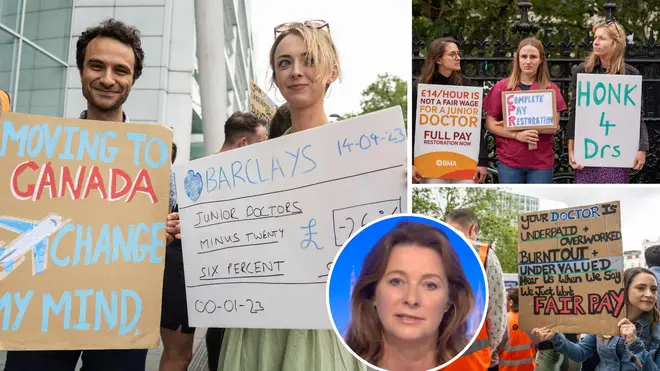
Junior doctors are on strike for a second day today despite being offered a ‘final’ deal by the government in the form of a six per cent salary rise.
The British Medical Association (BMA) says the raise in pay isn’t enough and has warned the government that they are in it “for the long run.”
But the Education Secretary said this morning that their starting point for negotiations is ‘unreasonable’.
Gillian Keegan argued it is ‘not easy to give pay rises as well as halve inflation’.
She told LBC: "Their starting position is an unreasonable position. We all understand there's been inflation and there's been a huge spike in inflation.
"And that's impacting all of us.
Read More: From Deadpool to Avatar: All the movies and TV shows that will stop filming due to Hollywood strikes
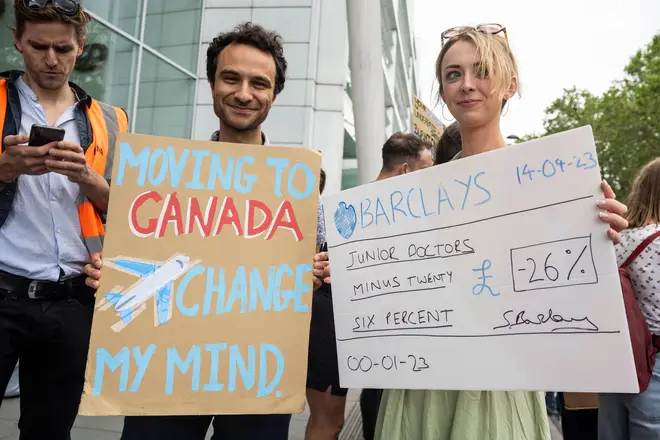
"That's why the main goal is to halve inflation. You can't chase it.
"I would urge them to take the same approach as everybody else actually."
Doctors have been urged to accept the pay rise of 6% offered by the government on Thursday, even as the head of the union slammed the attempt to end the strikes.
Prime Minister Rishi Sunak announced on Thursday that millions of UK public sector workers will get pay rises of 6% or more, including junior doctors.
Mr Sunak said that the offer, based on an independent recommendation, was final. "We will not negotiate again on this year's settlements and no amount of strikes will change our decision," he said.
Health Secretary Steve Barclay was similarly adamant. "The BMA should call off its strikes immediately," a source close to the minister told the Telegraph. "Further walkouts will benefit no one and put patients at risk. We are delivering a pay award that is both fair and affordable."
Meanwhile Steve Brine, Conservative chairman of the House of Commons health and social care committee, said: "Today, the Government has made a choice. So have the teaching unions. I would ask the British Medical Association to equally make a choice and know when to say yes.”
"As the Prime Minister has made clear, any further strikes will not change that settlement.“It’s time to move on from industrial action and to work together to cut waiting lists.”

Further doctor strike action likely according to BMA chair
But the BMA had been pushing for a 35% pay rise for its junior doctor members - and said the chances of more strikes were "very high".
Professor Phil Banfield, chairman of the union, slammed ministers' decision to cap the pay rise at 6%, saying it is "disingenuous" to suggest the government cannot afford more.
"I’ve seen nothing today that changes (our) situation. This government has had plenty of opportunity to negotiate,” Mr Banfield told LBC’s Andrew Marr.
“This government has spent more than it would cost to settle these strikes on paying the private rail companies to not settle the rail disputes," he continued.
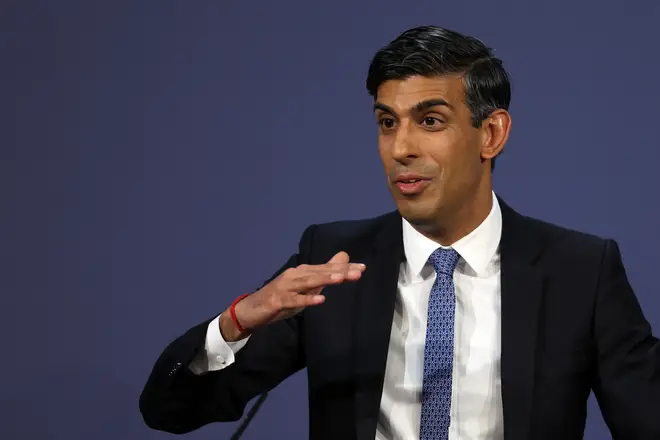
“We’ve had record profits from energy companies, so it is a complete fallacy that there is no money in the system. The staff on the NHS - nurses, doctors - deserve, fair pay.
"Unfortunately, the erosion of the pay of doctors is driving them away from the health service."
That means that junior doctors will still go on strike on Friday, while consultants are also due to walk out on two days next week.
Downing Street hit back, with Mr Sunak's spokesperson telling reporters: "I don't think the Prime Minister could have been clearer today. There will be no more talks on pay."
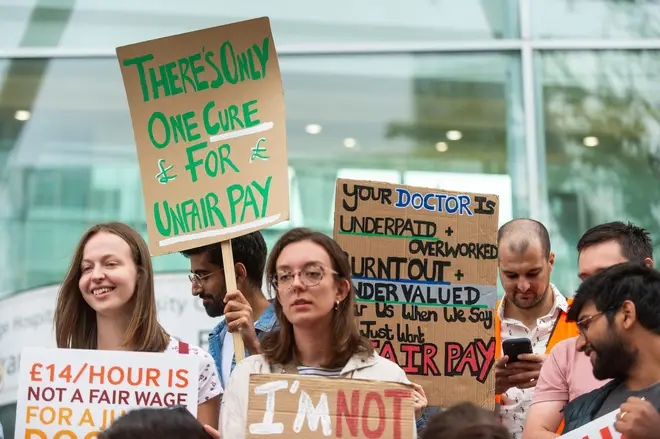
And even if the junior doctors do accept the pay rise, it may not be the end for the NHS' staffing woes, an industrial relations expert said on Thursday night.
"The worry of course is that some doctors are... going to drift across to Australia and elsewhere," Professor Roger Seifert told LBC's Colin Brazier.
"There is a real danger that even if you get the 6% that you get a further erosion of the staffing levels within the NHS, and that leads to a worse service."

Professor Roger Seifert: 'If the junior doctors escalate, we're in a desperately serious situation.'
Read more: How much is everyone going to get?
Meanwhile, the Prison Officers Association (POA) said it will "not back down" in the wake of pay rises offered by the Government.
National chairman of the union Mark Fairhurst said: "Those members who received between 7 and 10% will not be fooled by yet another below inflation award that will fail to convince them to stay in the service and will not improve their standard of living.
"Years of pay freezes and austerity now need to be addressed in future pay awards. We will now consider our options in relation to the failure to award a non-consolidated cost of living payment in line with other civil servants."
"We will do all in our power to address the concerns of our members. The POA will not back down," he added.
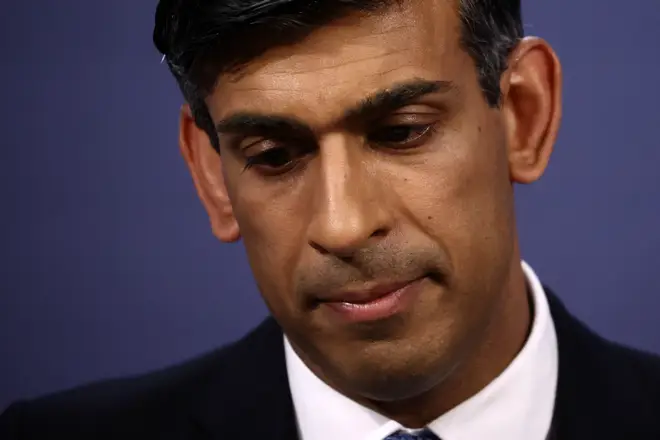
As well as junior doctors, teachers will be given a 6.5% rise and junior doctors will receive 6%.
Police and prison officers are expected to receive rises of 6% while armed forces personnel will receive 5-6%.
The Government's decision to rule out extra borrowing or higher taxes to fund the pay increases could leave departments forced to find £3 billion from existing budgets.
More than £1billion will come form “significantly” raising fees on visa applications and access to the NHS for migrants.
A big chunk of the remaining funds will be found through "reprioritisation", which is understood to refer to cuts from department budgets or trying to underspend.
But the schools minister would not tell LBC on Thursday evening how the "reprioritisation" would work in practice, and what specifically would be cut. Nick Gibb told Andrew Marr that the details were still being worked out.
The pay increases:
The pay announcement caused four teaching unions to push for strikes to be called off. The ASCL, NAHT, NASUWT, and NEW have been asked to put the new deal to members with a recommendation to accept the significant raise in pay.
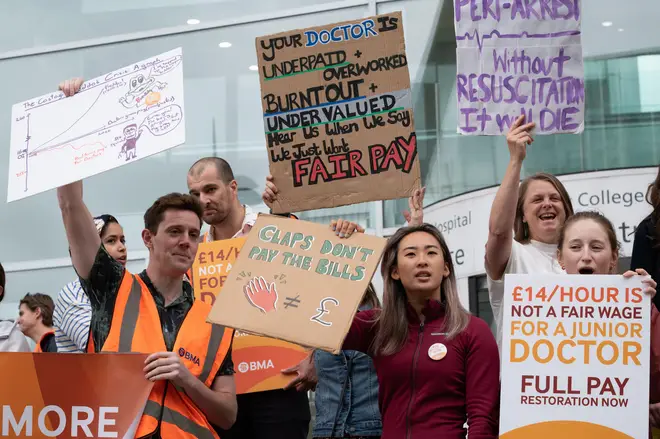
“The deal will allow teachers and school leaders to call off strike action and resume normal relations with the government,” a joint statement from Rishi Sunak and the unions said.
Treasury minister John Glen said the Government is taking steps to "deliver sound money while providing a fair pay deal to public sector workers".
He told MPs: "Today I can announce that the Government has accepted the headline recommendations of the independent pay review bodies in full.
"We are doing this whilst abiding by sound money which, as the Chancellor said at Mansion House on Monday this week, is our number one focus."

Doctor: 6% pay offer is 'insulting'
Mr Glen added that the Government will do "everything we can to tackle inflation", telling MPs: "That means we must take responsible decisions on the public finances, including public sector pay because more borrowing is itself inflationary.
"According to recent IMF estimates, advanced economies which increased public expenditure by one percentage point - which would mean £25 billion for the UK - saw inflation rise by half a percentage point.
"Yet our decision is responsible because, unlike some unsustainable demands, we have delivered awards that don't further fuel inflation and make the inflationary environment worse.
"We said we would accept the outcome of the public pay review bodies and that is exactly what we will do, and we will do so because we are proud of our world-class public servants and owe them a debt of gratitude for their service through the last few years, including through the pandemic."
Earlier, Chancellor Jeremy Hunt said the Government would take "difficult but responsible" decisions on public sector pay.
He told MPs that "it is important to deliver on the Prime Minister's priority to get debt falling and to control borrowing to avoid adding inflationary pressures and risk prolonging higher inflation".
"That means taking difficult but responsible decisions on the public finances, including public sector pay, because more borrowing is itself inflationary," Mr Hunt said.